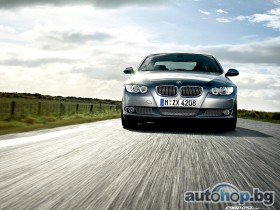Renault wins an environmental management prize
Following an award in 2005 for the eco-design of the Modus dashboard, Renault has won the "Environmental Management for Sustainable Development prize from the French Ministry of the Environment and Sustainable Development, one of the "2006 Companies and Environment awards. This prize rewards Renault
for the international deployment of its environmental management system, which aims to reduce the impact of its activities on the environment at every step in the vehicle life cycle by implementing special programs, training employees and making internal and external assessments. The award was presented by Nelly Olin, French Minister of the Environment and Sustainable Development, at the Pollutec exhibition in Lyons on November 28, 2006.
On November 28, 2006 Nelly Olin, French Minister of the Environment and Sustainable Development, presented Renault with the "2006 Companies and Environment award in the "Environmental Management for Sustainable Development category. This prize goes to companies whose environmental management fulfills sustainable development criteria and improves labor and economic performance. Renault won this year’s award
for the environmental management system it introduced a number of years ago.
For Alice de Brauer, Manager of Renault’s Environment Plan, "this prize rewards all the men and women from the environment network for implementing environmental management throughout the Renault group and across the entire life cycle of its vehicles. Receiving the award, she said, "since 1999, more than 50,000 Renault employees have been trained on environmental issues. Today, more than 90% of the Group’s production sites have received ISO 14001 certification, and this certification is also planned for the new acquisitions in Russia and Iran.
Environmental management at Renault: a global approach and measurable progress Renault is fully aware of environmental issues such as climate change, waste treatment and the depletion of natural resources, as it is of the role it has to play in this area. Renault introduced an ambitious environmental policy in 1995, based on the following key actions.
To enhance the way it reduces the environmental impact of its vehicles, Renault makes environmental analyses at all the world sites of the Renault, Dacia and Renault Samsung Motors brands. Renault also conducts Life Cycle Analysis (LCA) for all its vehicles, precisely identifying their environmental impact, from the extraction of petroleum and natural resources to production to logistics to use by the customer and to vehicle recycling.
To guarantee efficient environmental action, Renault works with its suppliers to obtain results on sustainable development. But it also works at the other end of the chain, through its involvement in deploying collection, dismantling and recovery services in order to recycle a wide range of materials used in the design of new vehicles.
Quantifiable results for these endeavors enable Renault to measure the progress made. For example, in ten years the amount of energy needed to produce a vehicle has been reduced by 25% and the amount of water by 57%. At the same time, CO2 emissions have been cut by an average 32 grams per kilometer, while vehicles are
now 95% recyclable.
Environmental management is effective because it involves a vast network of employees. At each Renault site, be it engineering, distribution, industrial, purchasing or legal, men and women work together with the Environmental Plan Department to ensure that environmental objectives are taken into account and fully applied in their own business lines. They do this by using simple tools such as the Function Recycling Indicator, which Renault’s Purchasing Division also shares with its suppliers, that measures the recycling potential of parts. Elsewhere, the Eco Index for packaging provides visibility on the ecological quality of parts packaging. Part of the "packaging
plan applied to manufacturing sites, this index has enabled a reduction of packaging waste per vehicle from 35 kg in 1995 to 15 kg today.
Since 1995, Renault has trained more than 50,000 employees in environment-related issues. The CAPECO 1 training module has, for example, been used to train 40,000 employees on ISO 14001 deployment at their sites. Further, around 2,500 staff members have followed the CAPECO 2 module on the subject of eco-design and how to integrate recycling factors right from the vehicle design phase.
For the sake of transparency, Renault makes public the environmental action it takes and the results achieved. Its customers and shareholders, along with residents living close to Renault sites, can access all this information in the company’s annual report, on www.renault.com, or via environmental declarations from each plant.
Renault is also making considerable efforts to share its experience in environmental management. In June 2006, it founded with several partners a regional club on the UN’s Global Pact with the objective of furthering exchanges between small- and medium-sized companies and major economic players on principles relating to human rights, labor standards, the environment and the fight against corruption.
Along with environmental analyses, Renault also uses indicators to measure the environmental impacts of its activities throughout the life cycle of its vehicles, including waste quantities, noise pollution, global warming potential, the depletion of natural resources and the creation of photochemical ozone.
External inspections conducted by independent bodies are also a good indicator of Renault’s efforts. Today, more than 90% of Renault’s industrial sites have received ISO 14001 environmental certification and have obtained the label Risque Hautement
Protégé label.
The Group’s most recent acquisitions are gradually integrating this approach, with Dacia’s main production site at Pitesti obtaining ISO 14001 certification in 2005.

 VOLVO BLIS получи престижна награда
VOLVO BLIS получи престижна награда
29 ноември 2006

 Световен дебют за Mazda Nagare в Лос Анджелис
Световен дебют за Mazda Nagare в Лос Анджелис
01 декември 2006
Коментари
Все още няма коментари. Бъдете първите, които ще изразят мнението си!










